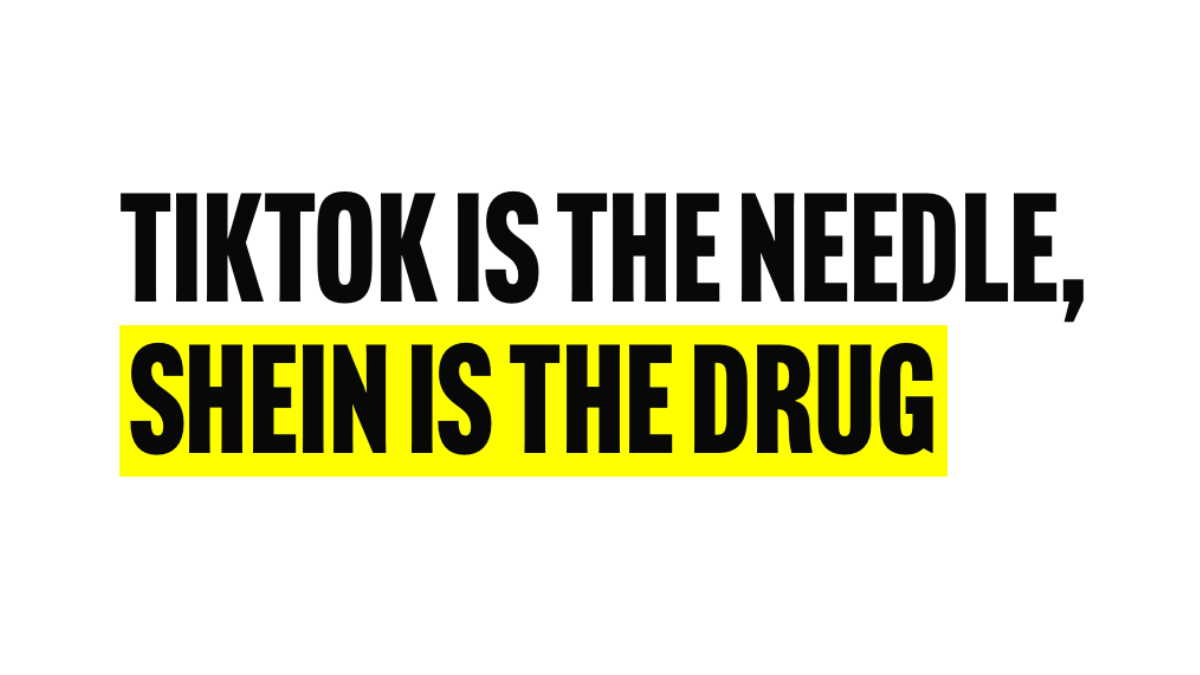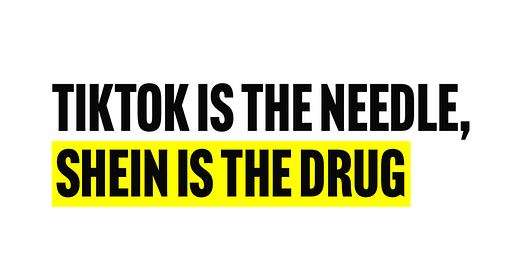China hawks are coming for Shein
The TikTok playbook is being used against the fast fashion retailer to serve corporate interests

Through 2023, we’ve already been treated to the renewed effort to ban TikTok in the United States, after previous attempts a few years ago under the Trump administration. We’ve seen Western governments ban TikTok from government devices, the US Congress hold a hearing with ByteDance CEO Shou Chew filled with misrepresentations, and most recently the attempted banning of the app in Montana — a move the company is challenging in court.
The campaign against TikTok is presented through the lens of US national security, but the real motivation is much easier to understand. The US tech industry is facing real competition for the first time in decades and is seeking to use broader geopolitical anxieties to protect itself. Meta, which owns Facebook and Instagram, has been funding a campaign against TikTok and its head of global affairs Nick Clegg has been using anti-China rhetoric to argue against its Chinese competitor.
Now the TikTok playbook is being rolled out against another Chinese company challenging its US and Western counterparts. Shein is an online fast fashion company that takes the model pioneered by companies like H&M and Zara and brings it to another level. Shein constantly has new styles because it orders batches as small as 100 items from a flexible supply chain it’s developed over many years in China.
Since 2020, it’s become much more popular around the world. It’s the largest fast fashion brand by market share in the United States, but its growth has slowed over the past year. Clearly, that competition has annoyed companies that used to dominate the sector and have not been able to keep up.
Recognizing the growing anti-China sentiment and seeing the effort to ban TikTok, a new campaign called Shut Down Shein was launched in March. It claims that Shein is a threat to US national security, but like with TikTok, the real motivation seems pretty obvious: Shein’s competitors see an opportunity to use the political climate to their economic advantage.
Misleading arguments
On its website, Shut Down Shein claims that the clothing retailer is “the biggest national security threat you’ve never heard of,” and explicitly links Shein to TikTok, claiming, “TikTok is the needle, Shein is the drug.” Through its provocative language, it argues that Shein is controlled by the Chinese Communist Party — without evidence, of course — and makes a number of other questionable claims to convince people to support its ultimate goal: to shut down Shein.
The group claims that Shein is using cotton picked by forced labor in the Xinjiang region where China’s been accused of human rights violations. Shein denies those accusations, and says it has “zero tolerance for forced labor.” It’s entirely possible some of that cotton is in its supply chain, but given Shein is in fast fashion, only 4% of its products are reported to even be made from cotton — most are from synthetics like polyester. But it’s been enough to get a bipartisan group of US lawmakers to request the Securities and Exchange Commission investigate the matter in case Shein tries to list itself on the New York Stock Exchange, something the company says it has no plans to do. (Other companies like Amazon have faced similar accusations.)
Even more egregious though is the claim that Shein is “turning American children into its accomplices” by exploiting a tariff loophole where imports valued at less than $800 are not subject to taxes and duty. The group claims that Shein is robbing the US Treasury of billions of dollars by taking advantage of the threshold and links to a report placing “the value of de minimis imports into the U.S. at $128 billion last year.” Yet, when you go read that report from the Coalition for a Prosperous America, it actually uses 2021 numbers and explicitly calls out “e-commerce merchants, led by Amazon,” for importing all those goods “free of tariff, taxes, or inspection.” In fact, it says Shein wasn’t included in the calculations at all.
The group also criticizes Shein for building “a sophisticated logistics operation that rival’s [sic] Amazon,” as if no other company is allowed to compete with a US behemoth, and for collecting data on its users — a completely normal practice that virtually every consumer-facing company does these days. It’s all bad when Shein does it, of course, because the company started in China (it’s now headquartered in Singapore) and that means it’s all controlled by the CCP — no evidence needed.
The real motivation
If it’s not already clear, the Shut Down Shein campaign is incredibly lazy and relies on tired Sinophobic arguments that will certainly snare some people devoid of critical thinking skills and who believe we need to be vehemently anti-China to protect US hegemony. But seriously, if US national security is so weak is can be threatened by a fast fashion retailer, the country has much bigger problems to worry about.
Is this to say that Shein is a shining beacon of corporate ethics and social responsibility? I highly doubt it. It is a fast fashion retailer after all, and that shows the serious problem with a campaign like this. When people were trying to ban TikTok, they rarely acknowledged that banning TikTok wouldn’t address the problems they pretended to care about — namely, China getting access to US user data. Instead, that would require much broader, industry-wide regulation that would apply not just to TikTok, but all social media companies or even every company collecting user data. But they explicitly did not want that — they just wanted to ban the competition. We see the same thing with Shein.
There are ample reasons to want to regulate the fast fashion industry. It’s been linked to all manner of environmental harm, unsustainable practices, and worker exploitation. Reports have detailed the abuse experienced by female textile workers in Asian factories, how those workers were subject to wage theft during the pandemic, and how fast fashion companies are constantly greenwashing their practices. That 2021 study by the Changing Markets Foundation found H&M to be the worst offender, with 96% of its sustainability statements amounting to greenwashing.
Shut Down Shein claims to be “a growing coalition of like-minded individuals and businesses,” but doesn’t actually identify its members. Semafor’s Louise Matsakis wrote last month that it’s using “an opportunistic strategy that could wind up engulfing a number of other firms from the People’s Republic, regardless of their actual business practices or corporate track record.” For all these reasons, it sounds to be like US competitors seeing a potential to cause problems for a major rival.
I’ve never bought anything from Shein, and don’t particularly care how it does as a company. But I do find it frustrating when self-serving actors can mislead the public through groups like Shut Down Shein. If lawmakers actually wanted to take action that was in the public interest instead of US or Western corporate interest, they’d pass comprehensive data privacy legislation, address import loopholes used by all companies, and pass strict labor and environmental regulations covering the fast fashion industry. But corporate America doesn’t want that; they just want to get rid of a competitor.




